In this latest instalment in the Hops Among Friends series, showcasing the people who make up the craft beer scene on the BC Ale Trail, Kim Lawton interviews Connor Blanchard from Luppolo Brewing.
My most recent Hops Among Friends interview was with Justin Larter from Barnside Brewing in Delta. At the end of our discussion, Justin recommended I speak with Connor Blanchard from Luppolo Brewing. Connor is the Lead Brewer at Luppolo Brewing, which was established in 2016 in East Vancouver on the Yeast Vancouver Ale Trail.
Luppolo (pronounced loop-o-lo), which is Italian for “hops” is known for their Italian-inspired craft beer and food. Connor and I had a great discussion about craft beer, living life in BC, and our shared love of outdoor adventures in our beautiful province. I really enjoyed our conversation, especially hearing about Connor’s passion for the evolution of the craft beer industry and his commitment to sustainability, supporting local producers, and using locally-sourced ingredients.
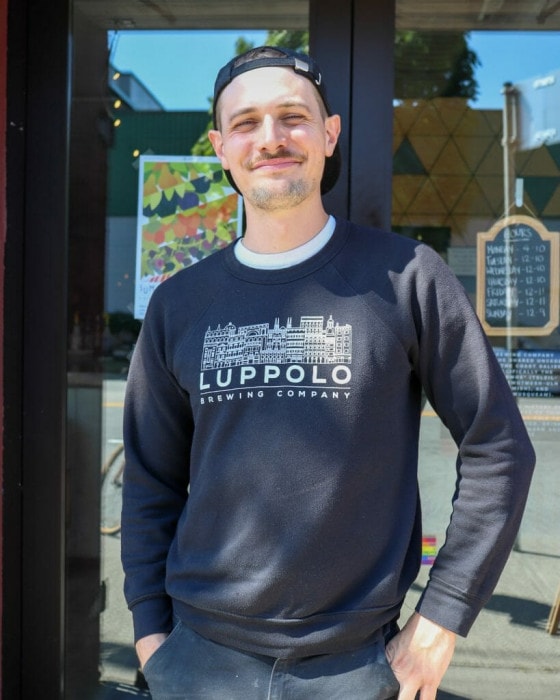
Kim: Tell me about how you got started in craft beer?
Connor: I have been going to breweries since I was a kid. My dad was big into craft breweries, and he always took us camping and to craft breweries. I’m from the US, and when I was 18, I was in university, and I met a guy who was home brewing. He brought in some of his beers, and I enjoyed trying them. So, I borrowed a home brewing kit from my cousin, and I fell super deep into home brewing. It was really fun, and a great creative outlet for me. I loved everything about it, and the industry overall. I love the alternative vibe and experimentation in the craft beer industry.
While I was in school and travelling for a couple of years, I’d seek out as much craft beer as possible. I ended up in New Zealand for a year. And from there I was emailing breweries and offering to work for free, although I wouldn’t recommend this approach. This was back when the industry was smaller. Now it’s easier to get your foot in the door. At that time, you had to know someone to get a job in craft beer.
So, I was continuing my homebrewing thing and applying to breweries. By this time, I was living in Victoria, and I applied for a job at Twin Sails Brewing. I was hired as a seasonal Brewery Assistant, so I packed my bags and headed for Port Moody. Mostly I was filling and cleaning kegs and tanks.
Then I talked to Tessa at Land & Sea Brewing in Comox. Right before they opened, I was hired as a Brewer’s Assistant. I worked there for two years. I enjoyed working with their pub-style system. I gained a lot of professional brewing knowledge from Tessa. She’s a very talented brewer. While working at Land & Sea, I met my partner, Lindsay. She was working at the brewery at the time, working in the tasting room. We’ve been together now for four years. It’s a lovely thing.
Beer brought me to my partner.
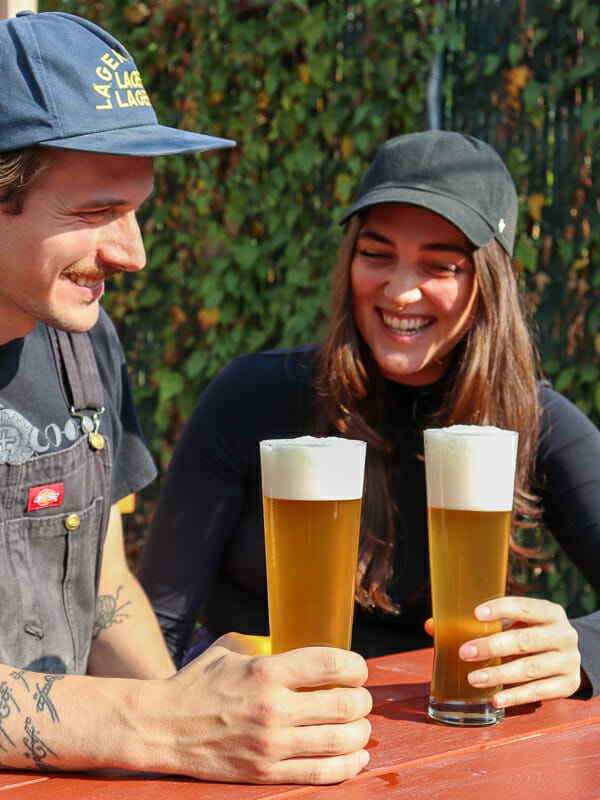
We decided that we wanted to move to Vancouver, which we did in February 2021. Right away, I got a job at Four Winds Brewing. I was there for about a year as a full-time brewer. I met lots of wonderful people there. However, for a number of reasons, it wasn’t the right place for me. I missed the smaller more experimental brewery setting.
That’s when I stumbled upon Luppolo. I’ve been here for about a year, and I am now the Lead Brewer. My partner, Lindsay is working close to home as the tasting room manager at Brassneck Brewery.
My experience has given me the opportunity to learn lots of different brewing styles in a number of different-sized brewhouses. I’m happy with the way that my career has evolved. In a way, I’ve come full circle back to what really suits me and keeps me inspired.
Kim: What do you love most about craft beer?
Connor: Generally speaking, I think what brought me in was the creativity and experimentation involved in craft beer. It’s a friendly industry to work in, and it is very collaborative. I enjoy the experimentation aspect of making something tangible that I can share with people. I am intrigued by terroir and the use of local ingredients, as I really like tying in the agricultural aspect of brewing. I really enjoy working with my hands. I’m not a person who likes to sit at a desk.
Kim: Why do you think the craft brewing industry became so collaborative?
Connor: I think that that’s kind of the nature of beer. Beer is something to share and bring people together. So that bleeds through into our whole industry. We share ingredients and we enjoy making collaboration beers. Lots of people have been in the industry for some time and are friends. The community spirit is one of my favourite things about the industry. For me, it’s not just about the people drinking the beer, it’s also about the people making the beer.
I also like the symbiotic relationships of the ale trails. We all work together and bring people to the area. We don’t look at each other as competitors like other industries do.
Kim: What do you love most about working at Luppolo?
Connor: There’s a lot. I love the team. It’s small and it really does feel like a family. I think because a lot of the team has been here for three-to-four years plus, I was received with open arms. I love the family environment, and I enjoy getting to know my coworkers really well.
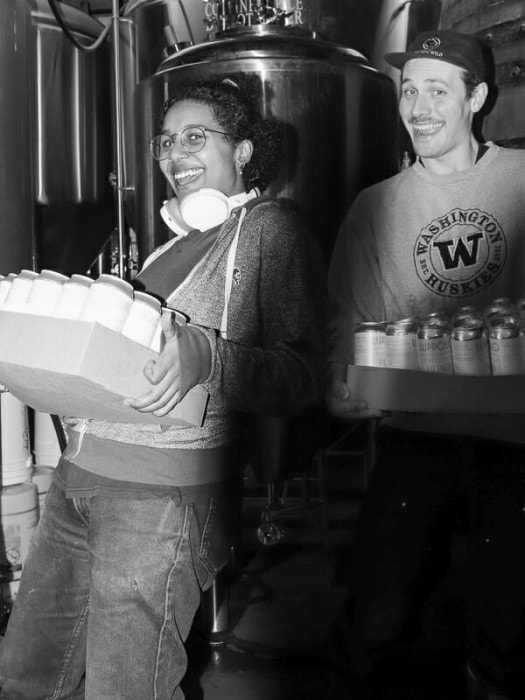
Additionally, our system and brewpub style are perfectly designed to experiment constantly. We are constantly tweaking our beers, even if it’s a beer that we make often, so I really enjoy this aspect of the job. Plus, Ryan, who is our head brewer and owner is super supportive. I feel included and heard in my role.
Kim: Tell me about something you are proud of that you’ve done at Luppolo?
Connor: I’m proud of a collaboration that I brought together with Luppolo and Tessa, my former boss at Land & Sea.
We made an Oyster Pilsner called Mare, which is sea in Italian. We made this beer entirely with local ingredients, other than our house lager yeast. This beer is really special to me because I brewed it with Ryan, my current boss, and Tessa, my previous boss, who really taught me about brewing standards.
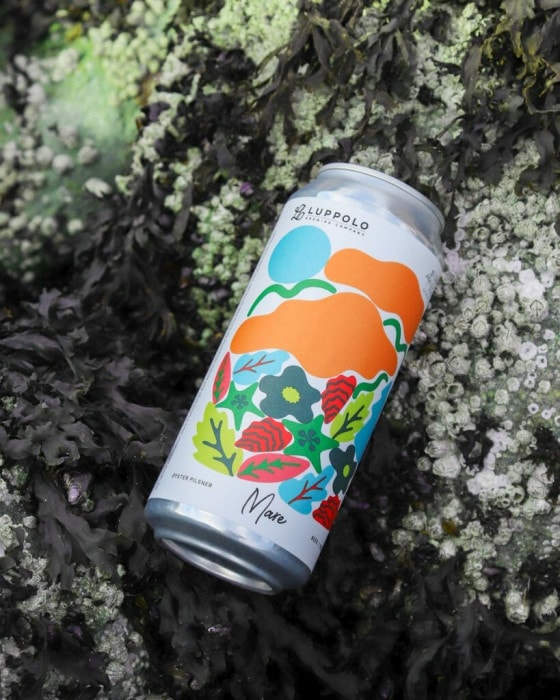
It was a great collaboration because Luppolo and Land & Sea’s philosophies are very similar. Mare is a sessionable, nuanced beer with ingredients reflecting BC’s terroir. It was made with grains from Field Five Farm in Saanichton. We used their Pilsner Malt, which is amazing. We liked it so much that we are starting to put this in other beers.
Mare was also made with 100% local Sterling Hops from Justin’s Barnside Brewing hop breeding program. The Sterling Hops were phenomenal and provided this beautiful bouquet of citrus and herbal character.
Tessa came in for the brew day and brought the oysters. She brought them from Fanny Bay, which is just south of Comox Valley. What a unique BC ingredient to be able to tie into and use in this beer.
We used oyster shells to modify the water used in this beer. They are high in magnesium and calcium which lends to the softness of the water profile. The salinity that you get is amazing. We used the oyster shells at the beginning. Then we put a few oysters in the whirlpool at the end, which we ate afterwards, of course.
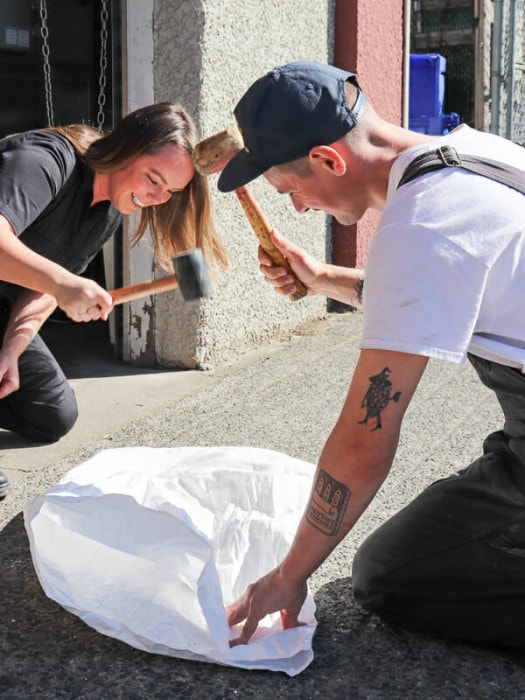
The beer was really well received. It sold out very quickly on draft at the brewery. So many things about this beer worked out well. The minerals and salinity from the oyster shells provided a fantastic mouthfeel. We also gave it a long lagering time, about eight weeks. We used all-natural carbonation to give a soft fluffy head of foam which was accentuated by our house slow pour. It really had everything going for it. We are looking at making this beer again next year. It was a super fun recipe to design and beer to make.
Kim: How important is it for you to work with local ingredients?
Connor: When looking at recipes, I like figuring out how to adapt recipes to use local ingredients. Finding and using local barley and hops is super exciting for me. We’ve been adapting our European beer styles to showcase more local products, which has been very interesting.
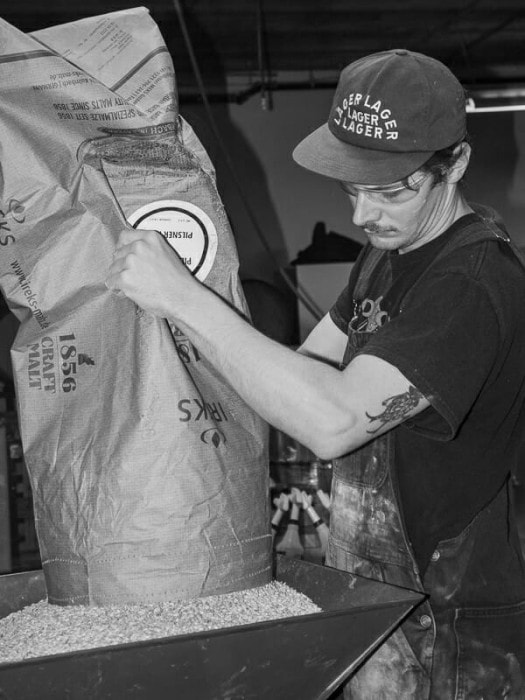
With climate change and the way the brewing industry is going, I believe that the focus on using local products is going to be incredibly important in the next 10-20 years. Having local producers that are making high-quality ingredients locally is amazing. I appreciate being able to make local beers with local ingredients. Therefore, supporting local producers is very important for me and us as well.
Kim: Luppolo has been around since 2016. What makes Luppolo so special?
Connor: Even before I worked at Luppolo, I observed how much care is put into the way the beer is served here. We do slow pours for all of our lagers because we think this is the best way to serve them. We’re talking about a five-to-seven minute multi-stage pour, every single time. This makes the beer so much smoother and frothier. It has a beautiful head of foam. This is a real priority for Luppolo. Even before I worked here, I’d come into the taproom to have a slow pour.
You can make the best beer possible, but it’s also about the service of the beer that truly makes it shine. We serve our beers in a clean glass with a substantial head of foam. Even if it’s a great beer, the way we serve the beer can completely change the experience.
Kim: Tell me about your beer philosophy at Luppolo?
Connor: Beer philosophy for me is all about intent and not rushing things. It’s about taking it slow and being methodical about how you do things and why you do these things.
It’s not just about throwing some random combination of crowd-pleasing flavours into it. I like when I can see all of the little things come together to make one great thing. The things that stand out the most for me are when I can look at how the beer is being served. Is it naturally carbonated? Are they using specific ingredients in a specific way to produce a specific result?
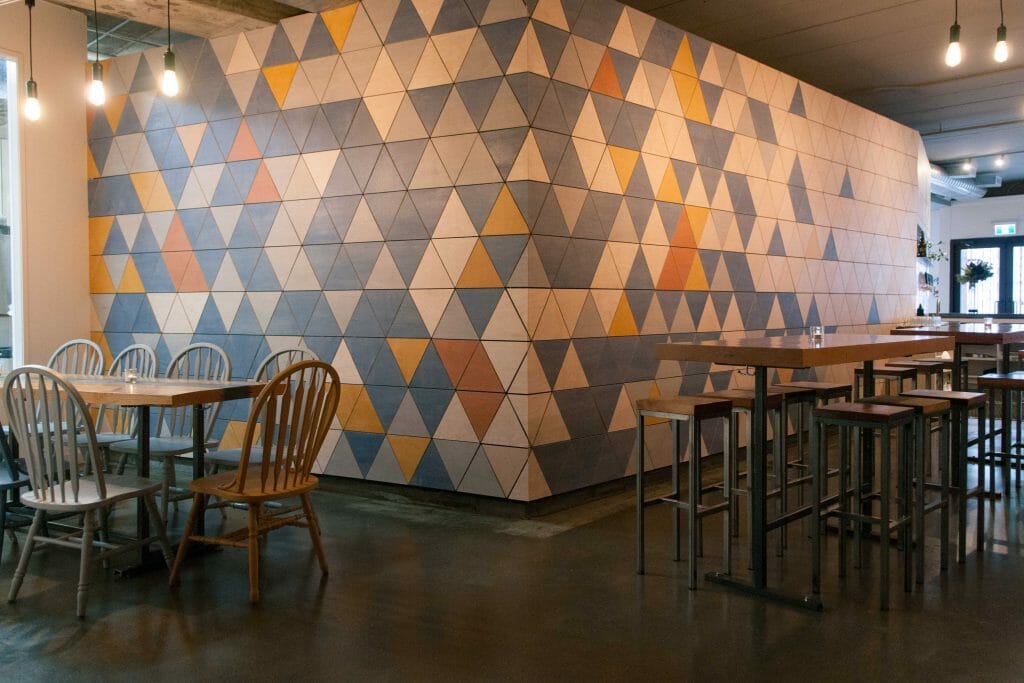
I believe it’s important to always give things time. It’s easy to feel rushed to get something done. There is a lot of pressure to get a beer out, but the beer takes as much time as it takes. If you can be really patient, the beer will tell you when it’s ready, and this can make such a difference.
For example, the old-school European brewing technique called decoction. This is when you take a portion of the mash and boil it and cook it, caramelizing the sugars in the mash, and then reintroduce it. It’s process things like this that really get me excited. Old-school brewers did this to break down the cell walls of under-modified malts in order to allow the enzymes to more easily be able to convert starches into fermentable sugars. We are experimenting with under-modified pilsner malt, specifically from Hogarth Malt in Olds, Alberta. It’s floor malted in a traditional way, and the beer is triple decocted, which adds a lot of richness, body and mouthfeel to the beer.
Kim: Tell me about something you have coming up at Luppolo?
Connor: We are launching a new series at Luppolo called the Forage series. It’s our barrel-aged, mixed-fermentation wild ales that have been conditioned or refermented on locally foraged ingredients.
We are working on the first beer in the series now. It was made this spring, so it is the Spring 2023 Forage series release. It’s a blend of barrel-aged mixed fermentation beer with our fresh Saison. It was steeped on freshly-picked magnolia blossoms from right by Ryan’s house. We were really surprised by this ingredient. There was so much evolution. It was very floral to start, and now there are tropical fruit notes. It’s awesome seeing the way the beer has evolved.
We are bottle-conditioning it now. We anticipate it being released in the fall, once the bottle conditioning has run its course. The beer is not yet named. Watch for it this fall in 750ml green bottles.
Our intention is to release a foraged beer in this series each spring, summer, fall and winter. We’ll be using unique, local ingredients such as dwarf cherries, kousa dogwood and other fun things we can find in and around the city. These are fun blends to showcase a unique piece of our region.
Kim: What is your favourite beer style?
Connor: I like all well-made beers, but I have been coming back to lagers to make and to drink. In general, my favourite beers are sub 5% that are clean, well-made, sessionable beers. I like lagers, pale ales, English pub-style beers, and Saisons, generally in the 3-5.5% range.
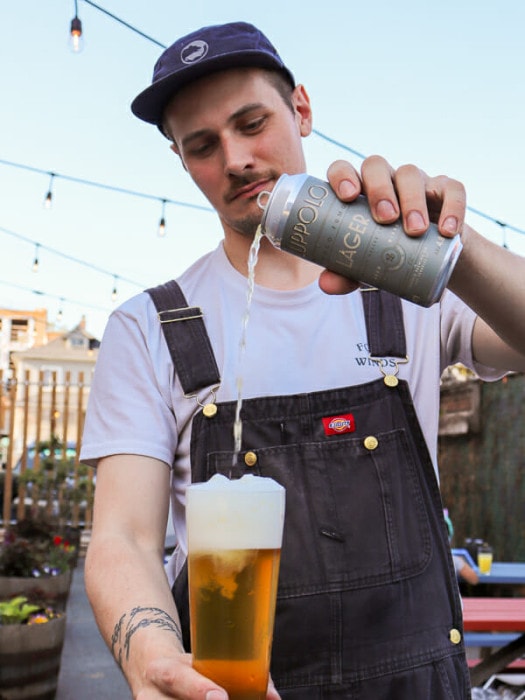
More specifically, I really enjoy Barnside’s Farmers Tap. Justin cares so much about what he does, and you can taste it in this beer, which showcases their local ingredients.
I am also often at Brassneck because my partner Lindsay works there. I really enjoy their No Brainer Corn Lager, which is 4.5% ABV. They recently got a Czech side pull faucet that they serve from, which is awesome.
Kim: What are some of your favourite beer festivals?
Connor: Farmhouse Fest is my ultimate favourite. I love the vibe. I love being out on the UBC farm. It is such an intimate and laid-back event, and I love drinking funky, low-alcohol beers. This event always makes me feel inspired.
This year, we are making the official beer of Farmhouse Fest, 2023. We brewed it with the above-mentioned, locally-sourced under-modified pilsner malt from Olds, Alberta. It’s a super rustic, traditional, open-fermented, triple-decocted Czech-style Pilsner based off the original Pilsner Urquell. We are going to serve this at the event in a gravity keg. It’s a very old school lager but made in Luppolo-style.
Also, when I was living in Victoria, I loved volunteering at Victoria Beer Week. I really enjoyed those events. I like a lot of the smaller beer festivals.
Another is of course our own Luppolo Lager Fest. This is where our local brewery friends come together to showcase lagers. It has real beer garden vibes. It’s a one-day event at the beginning of October featuring locally-sourced lagers. We generally have about seven to eight varieties ourselves, plus another four to six other lagers from other breweries on draft, as well as another four to six different unique lagers in cans. This should be our biggest one yet, and I can’t wait.
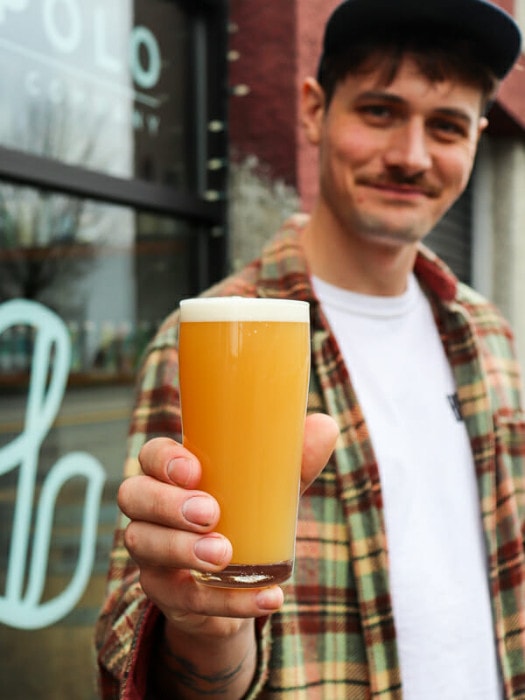
Kim: If you aren’t drinking craft beer, what are you drinking?
Connor: If I’m not drinking craft beer, I’m probably drinking coffee. I love our local coffee roasters. There are some real quality roasters, coffees and baristas here in Vancouver. I’d encourage people to go check out some of our coffee shops, have a nice pour-over coffee, crack open a good book, and take in the views.
Kim: What do you love about the craft beer scene where you live?
Connor: More than anywhere else in BC, I just love Vancouver and my area in East Van. There is an amazing variety of different, focused breweries. They make different styles of beer, but they have a specific character that feeds into all of their beers.
There are some really great breweries really close to us, within a five-minute walk including Brassneck, 33 Acres, 33 Brewing Experiment, Superflux and Slow Hand.
Kim: If you had out-of-town company visiting you, what hidden gems would you recommend?
Connor: I’ve lived in Vancouver for about two years now, so I’m still learning myself. I like to get on my bike and explore. When I’m not working, I’m generally going to the other breweries with my friends on my bike. I really enjoy biking. I actually bike to work most days.
We also have some great parks here. They are great spots for picnics and lawn games. I would also recommend biking along the seawall. I love hiking, and there is quite literally a vast and uncountable number of incredible hikes from anywhere between 30 minutes to three hours away. I go to the Island a lot as I have deep roots there and I really enjoy being out in nature.
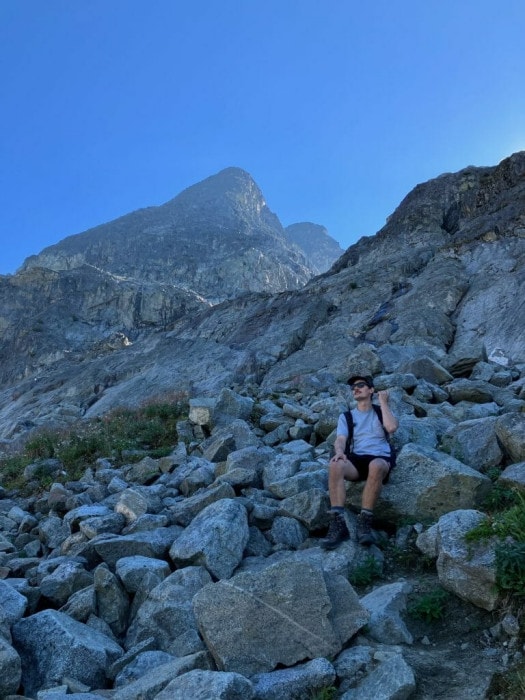
I’d also recommend out-of-town company check out our food scene here. We have great food here. There is so much variety with all of the ethnic food options. I’d suggest trying some foods that you may not be able to get in other more rural areas.
Kim: What are your thoughts on the future of the craft beer industry?
Connor: What’s going to be really important as a beer consumer and a supporter of the industry is the shift to thinking smaller. I think the size and scope of your brewery is going to be very important. Think small and think sustainable. Support local producers 100%.
In terms of shifts for the consumer? I think people are getting really excited for easy-drinking, nuanced beers. It’s not about the biggest, boldest beers. It’s about lower-alcohol beers, unique beer styles. Smoked beers and cask beers. I see lots of excitement and joy here.
Kim: Do you have any advice for those thinking about starting a brewery or getting into the industry?
Connor: If you’re in the industry or want to get into the industry, think small and sustainable. And be super thoughtful about how you train your staff and how you treat your staff. It’s tough to live in BC and make a living. So, it’s key that owners train their staff well and listen to their staff and make them feel heard. You can feel this when you go into a brewery. I’d say focus on your staff. Give them the tools, pay them, and support them. This is an industry that’s going to be around for a while.
Kim: Is there anything else you wanted to talk about?
Connor: Well, I really wanted to give a shout-out to my partner Lindsay. It’s so nice to be able to share our love of the industry together.
Kim: Who else in the craft beer industry do you find interesting and why?
Connor: I would love for you to talk to Tessa from Land & Sea Brewing in Comox. She is the Head Brewer at Land & Sea, and she was my former boss. She has over 10 years of experience and is very technical and methodical in her approach to brewing. She really cares about sustainability and using local ingredients in an interesting and unique way. She is also very thoughtful about the way she designs beer, and I think she will bring an interesting perspective about brewing and living in rural BC. I am super grateful for all that she has taught me, and I think you’ll have a great conversation with her.
Stay tuned for the next installment of the Hops Among Friends blog series, where I chat with Tessa from Land & Sea Brewing, on the Vancouver Island Ale Trail Part II.
Until then, cheers!




